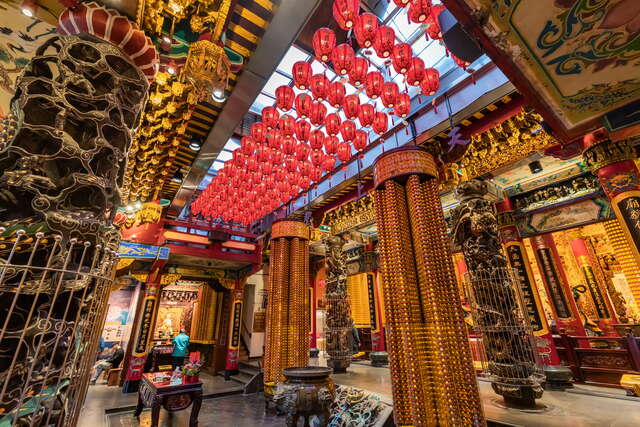Cihu Temple Introduction
In the bustling heart of Taoyuan City lies a significant religious site filled with incense smoke—Cihu Temple. This place is not only a core of local faith but also an important cultural and historical site that closely integrates traditional culture with modern life. Upon entering the temple, the intertwining of fragrant incense and a solemn atmosphere allows one to sense the stabilizing power of faith. The history of Cihu Temple, the core of the Matsu faith that has been passed down for 300 years, can be traced back to the 42nd year of the Kangxi era (1703) during the Qing Dynasty. It was originally established by the You clan, who brought the statue of Matsu from Wujie, Yilan. After several reconstructions and relocations, this temple ultimately settled in Nanguan Village, Taoyuan, becoming an important center of devotion in Northern Taoyuan. With a simple yet solemn worship pathway, Cihu Temple has streamlined its number of incense burners to two: the Tien Gong burner and the main burner, symbolizing both environmental friendliness and dignity. Devotees first offer the first stick of incense at the Tien Gong burner, then enter the main hall to respectfully worship the Heavenly Mother Matsu, followed by reverence towards other deities such as the God of Wealth, Wenchang Dijun, and the God of Love, before finally returning to the main burner to complete a spiritually enriching journey of blessings. Within the prestigious hall where Matsu sisters gather, Cihu Temple primarily enshrines the Heavenly Mother Matsu and also houses branches of Matsu statues from various places, forming a unique “Matsu Sisterhood,” making the faith community a cultural exchange event across regions. Additionally, the temple honors deities like Guanyin, the God of Wealth, and the Tai Sui Star Lord, ensuring that anyone seeking peace, prosperity, or love can find their respective blessings. The beauty of the architecture offers a visual and historical feast. The exquisitely detailed architecture showcases elements such as the Three Stars of Happiness, Prosperity, and Longevity on the roof ridge, warrior figures made of japanned clay from Tying, and intricate stone carvings—all exemplifying the endless charm of traditional craftsmanship. For photography enthusiasts, this location is a perfect venue to capture historical aesthetics. Embracing technology, Cihu Temple has introduced an electronic fortune-telling system, allowing devotees to interpret their fortunes in a modern way, providing convenience and thoughtfulness. This represents the best fusion of tradition and technology, bringing faith closer to everyone's daily life. The annual grand celebration—Matsu Cultural Festival—transforms Cihu Temple into a vibrant celebration center every April for Matsu's birthday. Activities such as the grand procession, thousands participating in the palanquin procession, and lighting ceremonies attract a continuous flow of followers and tourists, allowing everyone to immerse themselves in the charm of Matsu culture and the vitality of folk customs. Cihu Temple: a place of worship, a spiritual journey. It is not just a sacred space for believers seeking protection but also carries 300 years of culture and history. Whether coming to pray for blessings or to appreciate the beauty of ancient architecture, travelers can find inner peace and blessings in this thriving historic temple.







































